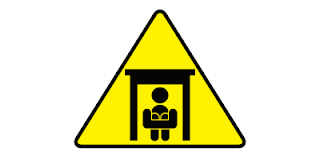The museum where I work is considered a port by the TSA, because lenders in other countries ship us artwork in sealed crates. The upshot of this is my fellow staff and I have had to have our backgrounds screened and we've received training on terrorist threats. The process has been relatively painless, but it did lead me to try to imagine how anyone might possibly take advantage of us as a conduit for nefarious cargo. It would require the culprits to have prior knowledge of which exhibitions we were going to be staging long enough in advance to go to the country from which art was being lent (which would also require infiltration), get hired by whichever art moving company the lender was going to use (and as this gets bid on, they'd have to have operatives in several) and then under the watchful eye of the conservators overseeing packing they would slip their IED (or whatever) into the crate. Then they would have to perform a similar inside job once the art arrived in America.
In short, it's perishingly unlikely; but the TSA is just doing their job, which is keeping us safe. The question is, how safe is safe? That's a question of nuance and the TSA doesn't do nuance. We all know the result: the long lines to be groped, barefoot, at airports. But the far greater cost is the cost to the soul: the constant agitation, fear, paranoia. If you see something, say something. Security is everyone's business. Think of the children. And so think of them, and we fret and obsess and distrust.
The most hilarious and shameful example of how this mindset messes with us is the Boston Mooninite scare of 2007. After the BPD misidentified the harmless LED signs as potential bombs and brought the city to a panicked halt, they proceeded to accuse the street artists who had installed the signs with intentionally perpetrating a hoax—when it was they who had misled the public. Instead of admitting their error and promising to adjust their policies to avoid such problems in the future, the police threatened the "perpetrators" with criminal action and accepted two million dollars from TBS as "compensation," all the while complementing themselves on their vigilance.
In his novel White Noise, Don DeLillo posits that the more modern medicine staves off death, the more we end up fearing death. A similar calculus applies to safety: the more security we achieve, the more that last bit of safety eludes us. In the absence of clear and present threats we manufacture wars that cannot be won: on terror, on drugs. But here's the thing: total security does not exist. As Kij Johnson wrote, "Nothing is certain. You can lose everything. Eventually, even at your luckiest, you will die and then you will lose it all." It's a hard truth, but accepting it is its only remedy.


No comments:
Post a Comment